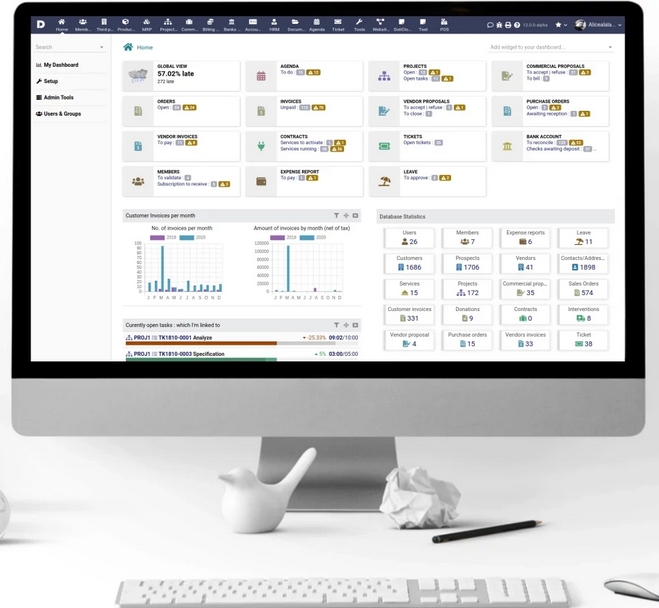Dolibarr Integration
These days, companies are constantly looking for ways to improve their operational efficiency. Dolibarr can be a wise choice to achieve this goal. By centralizing processes and data, it offers simplified management that enables companies to gain in productivity. In fact, it was designed to help optimize and simplify company management.Using DolibarrERP to automate numerous tasks, and improve the efficiency, productivity and traceability of your business processes.
Dolibarr ERP integration involves installing, configuring and synchronizing Dolibarr with other systems or applications used in a company. Integration improves data consistency, automates processes, centralizes information and optimizes business operations. This contributes to more efficient management and better decision-making.
Transform your business with Dolibarr: Simplify, Centralize, Succeed
In today’s business world, efficient operations management is essential to a company’s growth and success. However, companies need to be able to simplify processes, centralize data and maximize efficiency. That’s where Dolibarr ERP comes in . It’s a solution designed to transform businesses. It saves time and improves your team’s productivity. For example, integration with an accounting system will automate invoice generation and payment tracking. While integration with an inventory management system will ensure that stock levels are kept up to date. This facilitates replenishment orders.
Dolibarr Integration Experts: Give your business a digital edge
We offer a dolibar integration service, which involves setting up and customizing Dolibarr software to meet your company’s specific needs. This is a process that involves the configuration, installation, customization and commissioning of Dolibarr in order to integrate it seamlessly into the company’s existing environment.
Some of the software’s features
- Sales management: Sales tracking, payment management, quotations, orders, invoices, delivery notes, contracts and customer price lists.
- Purchasing management: tracking of purchasing costs, inventory management, expense reports, supplier management, quotation requests, orders, etc.
- Inventory management: support for advanced inventory management, including warehousing, stock movements, barcodes, procurement and inventories.
- Accounting and finance: management of accounts, journals, accounting entries, VAT declarations, bank reconciliations and the generation of balance sheets and financial reports.
- Human resources management : employee management module, employment contracts, leave, absences, timesheets and expense reports.
- Project management: Create tasks, assign them to team members, track progress. Allocate resources and generate project reports.
- Customer Relationship Management (CRM): integrated CRM module for managing contacts, prospects, sales opportunities, marketing campaigns and sales follow-up activities. It also facilitates the management of customer interactions and the generation of reports on CRM performance.


